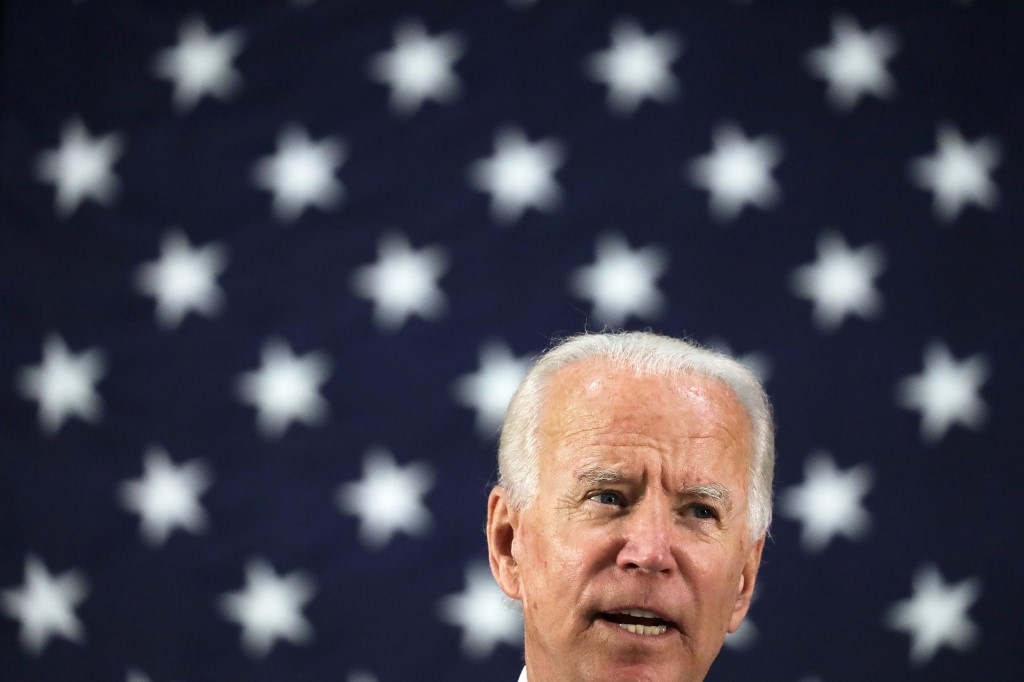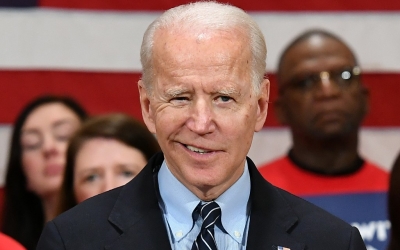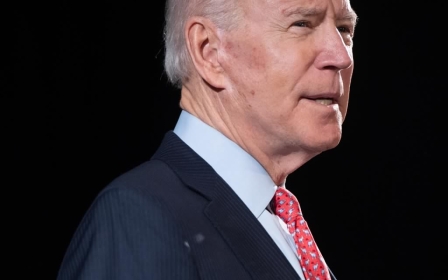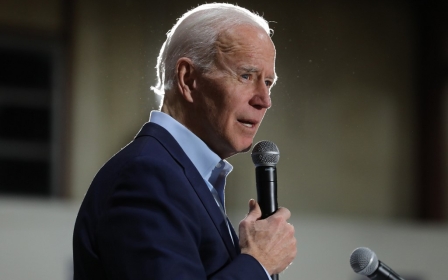A letter to Joe Biden: Stop your blind support for Israel

US presidential candidate Joe Biden wants you to believe that he is opposed to Israel’s likely annexation of parts of the occupied West Bank, which Prime Minister Benjamin Netanyahu plans to carry out this month.
“I do not support annexation,” he said during a recent call with American Jewish donors. And yet, Biden’s senior foreign policy adviser, Antony Blinken, has insisted that under no circumstances - not even the annexation of the West Bank - would Biden consider reducing or withholding US military aid to Israel.
In addition, contrary to the position of his former boss, US President Barack Obama, Biden also pledged that, if elected, he would keep disagreements with Israeli policies private.
Questioning US-Israel relations
That’s not what the American people want.
In a new Washington Post poll, 67 percent of respondents said that it is “acceptable” or actually the duty of elected representatives to question the Israel-US relationship. Among Democrats, that number was an overwhelming 81 percent.
The call to be more openly critical of Israeli policy reflects Israel’s continued lurch to the right and US President Donald Trump’s embrace of that, as well as diligent campaigning by Palestinian-Americans and progressive American Jews.
Another factor was the example set by Jewish presidential candidate Bernie Sanders, who talked passionately about Palestinian rights.
Biden's positions on Israel/Palestine are to the right of those of Obama ... and only a pinch less hawkish than Trump's
The sentiment that US leaders must take a critical look at Israeli policies is reflected in a letter recently sent to Biden by more than 100 groups, calling on him to adopt policies towards the Israeli government and Palestinian people “based on the principles of equality and justice for all”.
Endorsers include the American Friends Service Committee, American Muslims for Palestine, CODEPINK, the Council on American-Islamic Relations, IfNotNow and Jewish Voice for Peace, among others.
The letter arose out of concern that Biden’s positions on Israel/Palestine are to the right of those of Obama, who openly clashed with Israel on issues such as illegal settlements and the Iran nuclear deal - and only a pinch less hawkish than Trump's.
Unwavering support
Biden’s positions were made painfully clear in a statement on his campaign website entitled “Joe Biden and the Jewish Community: A record and a plan of friendship, support, and action”. It opened by conflating the Jewish state with Jewish values and went on to brag about Biden’s role in increasing military aid to Israel at the end of the Obama administration.
It also promised that Biden, in violation of the first amendment, would continue attacks on individuals and organisations that boycott Israel for political reasons and referred to Palestinian “choices” to commit violence.
Within days of the statement’s release, the backlash was so fierce that the degrading language of Palestinian “choices” was removed - but the statement remains a testament to Biden’s unwavering support for the rightwing Netanyahu government.
While Biden is tone deaf to changing US sentiments towards Israel, many in the Democratic party are leaving him in the dust.
The sea change among Democrats in general, and young Jews in particular, was best captured during a few key moments in the Democratic presidential race. The first was in March 2019, when most candidates refused to attend a conference sponsored by the American Israel Public Affairs Committee (AIPAC), recognising the pro-Israel lobby as an impediment to achieving a just and lasting peace in Palestine/Israel.
Another key moment was at an October 2019 conference, organised by the liberal Jewish group J Street, when the audience burst into applause after then-candidate Sanders suggested leveraging the $3.8bn the US gives Israel annually towards pushing Israel to respect Palestinian human rights.
During the primaries, Sanders was also lauded for accurately referring to Saudi Crown Prince Mohammed bin Salman as a murderer and Netanyahu as a racist.
Striving for fairness and equality
When Sanders suspended his run for the Democratic nomination, Biden indicated that he would integrate some of the politics of the party’s progressive wing to reflect the energised grassroots movement the Sanders campaign had built.
He set up task forces to focus on healthcare, immigration, education, criminal justice reform, climate change and the economy, and tapped popular politicians such as Progressive Caucus co-chair Pramila Jayapal and Representative Alexandria Ocasio-Cortez.
But no task force was set up for foreign policy, and Biden has done nothing to incorporate progressive concerns into his Israel/Palestine platform.
That’s why the letter to Biden by more than 100 organisations is so critical.
It points out that by giving Israel “unlimited diplomatic protection and massive military financing”, the US “has enabled the country to entrench its occupation, expand its illegal settlements, impose a 13-year-long siege and wage three wars against Gaza, [and] pass laws that officially deny equal rights to Israeli citizens who are not Jewish, all under the veneer of peacemaking”.
The letter lays out the tenets of a strategy based on fairness and equality, including: explicit opposition to Israel’s occupation of the West Bank and blockade of Gaza; recognition of Israel’s obligations towards the inhabitants of Gaza; support for conditioning US military funding to Israel on an end to Israeli violations of Palestinian human rights and adherence to all relevant US laws; and ensuring that no US dollars contribute to Israel’s military detention, interrogation or other ill-treatment of Palestinian children.
Other points include: calling on Israel’s government to repeal the Jewish nation-state law and to ensure that non-Jewish citizens in the country enjoy equal rights; opposing the use of US aid against protected populations, including in Gaza; supporting Palestinian refugee rights; vowing to relocate the US embassy back to Tel Aviv; promising to cooperate with the International Criminal Court (ICC)’s investigation into alleged war crimes committed by all sides in the West Bank and Gaza; and rejecting US recognition of Israeli sovereignty over any territories now occupied, absent an internationally recognised final agreement with Palestinians.
Maintaining the status quo
The signatories want Biden to oppose illegal and immoral Israeli policies, such as annexation, with deeds, not just words. To be fair, Biden is far from the only Democratic party leader paying lip service to opposing annexation while acting to maintain the status quo.
Recently, 120 lawmakers in the House and 30 in the Senate sent letters voicing their opposition to annexation.
Biden's unconditional support for Israel's rightwing government is not only less and less popular among Americans, it also guarantees continued repression against Palestinians
They included such stalwart backers of Israel as Chuck Schumer, Robert Menendez, Ben Cardin and Steny Hoyer.
Hoyer is known for being the closest member of Congress to AIPAC, and Schumer, Cardin and Menendez were three of the only four Senate Democrats to support Israel’s opposition to the Iran nuclear deal in 2015.
They are also leaders of legislation to outlaw the boycott, divestment and sanctions (BDS) movement, even at the expense of the first amendment.
While it is a remarkable achievement that so many Democratic lawmakers registered their opposition to annexation, without measures to hold Israel accountable such statements are toothless.
With annexation imminent, a case pending in the International Criminal Court for war crimes and Gaza trapped in a 13-year siege complicated by a pandemic, the stakes are high.
Biden’s unconditional support for Israel’s rightwing government is not only less and less popular among Americans, it also guarantees continued repression against Palestinians and continued unrest in the region.
Let’s hope this letter shows Biden the widespread support for him to shed his “Israel-right-or-wrong” position and instead openly and explicitly distinguish right from wrong.
The views expressed in this article belong to the authors and do not necessarily reflect the editorial policy of Middle East Eye
Middle East Eye propose une couverture et une analyse indépendantes et incomparables du Moyen-Orient, de l’Afrique du Nord et d’autres régions du monde. Pour en savoir plus sur la reprise de ce contenu et les frais qui s’appliquent, veuillez remplir ce formulaire [en anglais]. Pour en savoir plus sur MEE, cliquez ici [en anglais].






